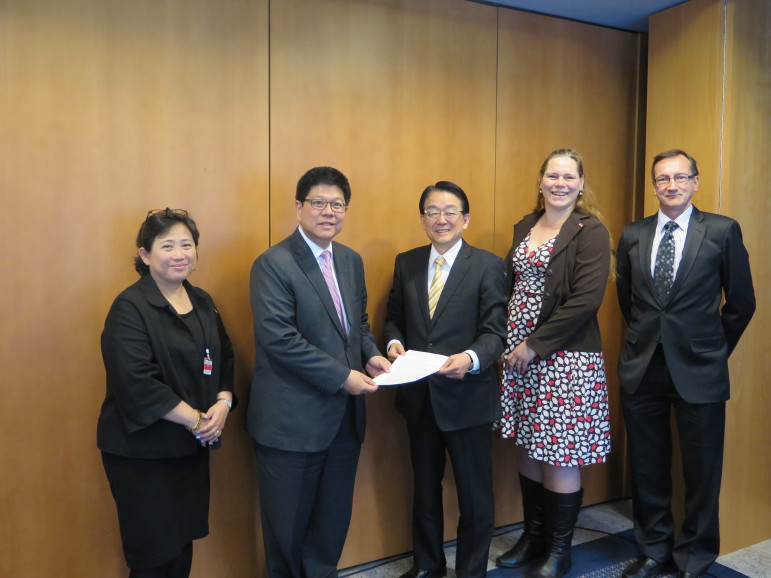During the recent meeting in Geneva of the “Open Ended Working Group to take forward multilateral nuclear disarmament negotiations”, or nuclear working group, a group of diverse faith-based organizations issued a powerful interfaith statement highlighting the moral and ethical imperatives for the abolition of nuclear weapons.
The statement reads: “Nuclear weapons are incompatible with the values upheld by our respective faith traditions—the right of people to live in security and dignity; the commands of conscience and justice; the duty to protect the vulnerable and to exercise the stewardship that will safeguard the planet for future generations.” The full text is below.
The statement, which was presented to OEWG Chair Ambassador Thani Thongphakdi of Thailand on May 3, urges the working group to focus on the humanitarian impact of nuclear weapons, for all states to participate in nuclear disarmament efforts in good faith, and the early adoption of a legal framework that will facilitate the prohibition and elimination of nuclear weapons under strict international control.
PAX, the Soka Gakkai International (SGI) Buddhist association and the World Council of Churches (WCC) took the lead in drafting the statement, which is titled “Faith Communities Concerned about the Humanitarian Consequences of Nuclear Weapons.”
Faith groups and individuals wishing to add their names to the statement can do so
by emailing y-matsuoka [at] soka.jp.
Full Text:
Public statement to the Open-ended Working Group
Taking forward multilateral nuclear disarmament negotiations (OEWG)
Faith Communities Concerned about the
Humanitarian Consequences of Nuclear Weapons
May 2016, Geneva
Since August 1945, when the cities of Hiroshima and Nagasaki were subjected to atomic attack, the continued existence of nuclear weapons has forced humankind to live in the shadow of apocalyptic destruction. Their use would not only destroy the past fruits of human civilization, it would disfigure the present and consign future generations to a grim fate.
Nuclear weapons are incompatible with the values upheld by our respective faith traditions—the right of people to live in security and dignity; the commands of conscience and justice; the duty to protect the vulnerable and to exercise the stewardship that will safeguard the planet for future generations. Nuclear weapons manifest a total disregard for all these values and commitments. There is no countervailing imperative—whether of national security, stability in international power relations, or the difficulty of overcoming political inertia—that justifies their continued existence, much less their use. Their catastrophic humanitarian consequences demand that nuclear weapons never be used again, under any circumstances.
We raise our voices in the name of sanity and the shared values of humanity. We reject the immorality of holding whole populations hostage, threatened with a cruel and miserable death. We urge the world’s political leaders to muster the courage needed to break the deepening spirals of mistrust that undermine the viability of human societies and threaten our shared future.
For decades, the obligation and responsibility of all states to eliminate these weapons of mass destruction has been embodied in Article VI of the Treaty on the Non-Proliferation of Nuclear Weapons (NPT). Progress toward the fulfillment of this repeatedly affirmed commitment has been far too slow, at times imperceptible.
As people of faith, we urge the OEWG to:
- Heed the voices of the world’s hibakusha (atomic bomb survivors) urging the abolition of nuclear weapons, whose suffering must never be visited on any other individual, family or society, by reaffirming that the humanitarian impact of nuclear weapons remains at the core of all nuclear disarmament efforts;
- Continue to call upon all states to participate in the OEWG and subsequent processes in order to fulfill their obligation to pursue in good faith and bring to a conclusion negotiations leading to nuclear disarmament;
- Outline in its report to the UN General Assembly, with the maximum degree of detail, a legal framework that will facilitate the prohibition and elimination of nuclear weapons under strict international control, which should be negotiated without delay in a forum open to all states and blockable by none.
Susi Snyder, PAX
Hirotsugu Terasaki, Soka Gakkai International (SGI)
Emily E. Welty, World Council of Churches (WCC)

